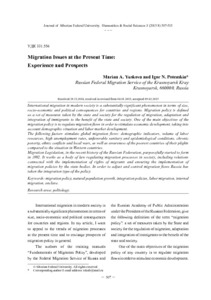Migration Issues at the Present Time: Experience and Prospects
Скачать файл:
URI (для ссылок/цитирований):
https://elib.sfu-kras.ru/handle/2311/16738Автор:
Yuskova, Marina A.
Potemkin, Igor N.
Юскова, М.А.
Потемкин, И.Н.
Дата:
2015-03Аннотация:
International migration in modern society is a substantially significant phenomenon in terms of size,
socio-economic and political consequences for countries and regions. Migration policy is defined
as a set of measures taken by the state and society for the regulation of migration, adaptation and
integration of immigrants to the benefit of the state and society. One of the main objectives of the
migration policy is to regulate migration flows in order to stimulate economic development, taking into
account demographic situation and labor market development.
The following factors stimulate global migration flows: demographic indicators, volume of labor
resources, high unemployment rates, unfavorable sanitary and epidemiological conditions, chronic
poverty, ethnic conflicts and local wars, as well as awareness of the poorest countries of their plights
compared to the situation in Western countries.
Migration Legislation, in the recent history of the Russian Federation, purposefully started to form
in 1992. It works as a body of law regulating migration processes in society, including relations
connected with the implementation of rights of migrants and ensuring the implementation of
migration policies by the state bodies. In order to adjust and control migration flows Russia has
taken the integration type of the policy Международная миграция в современном обществе является довольно значимым явлением
с точки зрения масштабов, социально-экономических и политических последствий для
стран и регионов. Миграционная политика определяется как комплекс мер, принимаемых в
государстве и обществе для регулирования переселений, адаптации и интеграции переселенцев
в интересах этого государства и общества. Одной из основных задач миграционной политики
является регулирование миграционных потоков с целью стимулирования экономического
развития страны с учетом демографической ситуации и развития рынка труда. К факторам,
стимулирующим мировую миграцию, относятся показатели демографии, объем трудовых
ресурсов, высокая безработица, неблагополучная санитарно-эпидемиологическая обстановка,
хроническая бедность, межнациональные конфликты и локальные войны, а также осознание
населением беднейших стран своего тяжелого положения по сравнению с жителями стран
Запада.
Миграционное законодательство в новейшей истории Российской Федерации целенаправленно
формируется с 1992 года и представляет собой совокупность норм права, регулирующих
миграционные процессы в обществе, включая отношения, связанные с реализацией прав
мигрантов и обеспечением реализации государственными органами миграционной политики.
Россия для формирования и контроля миграционных потоков приняла интеграционный тип
политики
Коллекции:
Метаданные:
Показать полную информациюСвязанные материалы
Показаны похожие ресурсы по названию, автору или тематике.
-
Историографический обзор подходов и концепций по проблеме миграции в зарубежных и российских исследованиях XX века
Замараева, Ю.С.; Zamaraeva, Julia S. (Сибирский федеральный университет. Siberian Federal University., 2010-06)Миграция определила эпоху XX века и позволила осуществиться межкультурной коммуникации. В связи с этим перед многими культурными группами остро встала дилемма: продолжение своего локального существования с целью сохранения ... -
Forced Migration in Modern Europe and Russia: Situation, Problems and Possible Ways to Optimize the Refugee Law
Volokh, Vladimir A.; Волох, В.А. (Сибирский федеральный университет. Siberian Federal University, 2016-04)The article by Professor V.A. Volokh is dedicated to one of the most controversial issues of our time – migration issues in and out of Russia. In the context of economic and political globalization not only basic ... -
For the Sake of Faith of for the Sake of Land? Religion as a Factor of Conflicts between Migrants and Old-Dwellers in the Course of the Great Siberian Migration (Evidence from the Ognevo Village, Biysk District)
Kirillov, Alexey K.; Karavayeva, Anastasiya G.; Кириллов, А.К.; Караваева, А.Г. (Сибирский федеральный университет. Siberian Federal University, 2018-09)The article draws reader’s attention to the peasant migration from European Russia to Siberia between the abolition of serfdom at Russia (1861) and World War I (1914). This phenomenon is well known as an example of successful ... -
The Experience of Assessing the Human Capital of Labor Ethnic Migration (Based on the Study of the Novosibirsk Region)
Mikidenko, Natalia L.; Monastyrskaia, Tatiana I.; Storozheva, Svetlana P.; Микиденко, Н.Л.; Монастырская, Т.И.; Сторожева, С.П. (Сибирский федеральный университет. Siberian Federal University, 2017-09)The need to assess the potential of labor migration is caused by the problems of effective management of incoming migration flows. The region that accepts labor migrants should be guided in the formation of their migration ... -
Development of Theoretical Provisions on the Adaptation and Integration of Migrants
Kononov, Leonid A.; Ledeneva, Viktoria Yu.; Кононов, Л. А.; Леденева, В. Ю. (Сибирский федеральный университет. Siberian Federal University, 2019)Recently, the terms “adaptation and integration of migrants” are often found in scientific and public literature. However, there is still no unified opinion and clear understanding of the essence and content of these ...

